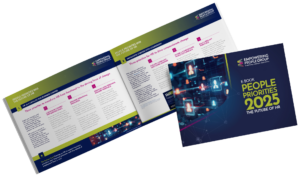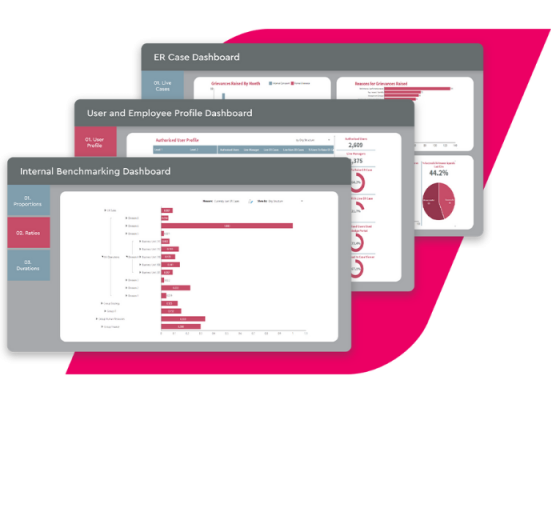Simplifying employee relations to transform HR
![]() managers to own 90% of people matters
managers to own 90% of people matters
Reduce ER case advisory costs by up to 65%
Reduce absence rates, tribunal claims and costs

Employee relations 2.0: Simplify ER case management with 
In today’s complex world of work, organisations need agile solutions to thrive. empower® is an award-winning employee relations (ER) case management system, uniquely designed to transform ER processes and empower line managers to confidently navigate people matters. By simplifying ER case management and providing powerful HR data analytics, empower® improves employee experiences and delivers a significant ROI, reducing absence rates, employment tribunal claims, and HR costs. Watch video >
Just some of the organisations we support
Find out more about the award-winning empower®
Transforming the future of HR with 

Empower managers, backed by HR expertise
empower® is the only employee relations case management system that empowers line managers to self-serve employee relations matters through guided journeys, backed up by outsourced HR advisory expertise. Organisations average 90% of ER tasks being confidently and consistently owned by line managers.
- Digital guided journeys aligned with your policies and processes.
- In-built guidance to develop line manager confidence and skills.
- Control points, automated prompts and escalations to drive consistency and manage risk.
- Consistent and compliant steps, and a full audit trail at the touch of a button, reduces risks.

Reduce costs to achieve significant HR ROI
empower® delivers a compelling ROI by digitally transforming ER case management and empowering managers to take ownership of people matters. This approach creates an agile employee relations operating model that reducing HR costs. It also improves employee experiences and helps to reduce absence rates and employment tribunal claims.
- We support your business case, demonstrating quantifiable ROI. Take this free assessment.
- Optional outsourcing of HR advisory services can significantly reduce costs.
- HR teams have more capacity to focus on supporting complex issues and strategic priorities.

Actionable insights for a data-driven HR strategy
Dynamic dashboards and expert analytics services provide real-time actionable insights that transform ways of working in HR and the wider business. Go beyond basic metrics and accelerate insights that enable a data-driven approach to strategic objectives.
- Faster, data-driven business decisions.
- Identify the root cause of issues impacting productivity and employee experiences.
- Benchmarking and continuous optimisation to drive ongoing efficiencies and transformation.
- Streamline reporting and analysis of trends, replacing spreadsheets.
Digital simplicity that empowers managers and drives the future of work
By combining our unique cloud technology, data insight and expert HR guidance, we help you empower your leaders, engage your people and improve business efficiency. Delivering a positive ROI, improved productivity, reduced sickness absence and risk mitigation, our business-changing solutions build healthier, more agile organisations where people can thrive.
At the heart of what we do lies the digital transformation of employee relations processes, giving HR leaders more time to focus on what they are truly passionate about – supporting their people and the business.
See the results empower® achieves in 12 months
Improve employee experiences, drive efficiency and reduce costs
Fewer employee relations matters escalating to HR
Dynamic dashboards for real-time case visibility and insightful analytics
More time to focus on complex cases and strategic priorities
Enable managers to self-serve people matters 24/7 without involving HR
Confidently and consistently manage employee relations matters
Empower managers to build stronger connections with direct reports
Reduce HR’s cost to serve while uplifting service quality
Improve employee experiences and culture
Develop a business-driven HR function that supports strategic goals
Discover how transforming employee relations can benefit your organisation

People priorities 2025: The future of HR E-book
The future of HR requires bold, transformative action. As organisations face turbulent change, rising workforce costs, and evolving legislation, HR must shift its perception from a traditional support function to a strategic powerhouse. Be one of the first to download this E-book for practical solutions to turn today’s challenges into lasting, positive transformation.
HR transformation case studies
Complementary HR services that empower your people

HR outsourcing and consultancy
Whether you’re looking to outsource HR support, policy reviews, redundancy or change support, or consultation on your DEI initiatives, our HR experts offer best practice advice and document writing services to ensure your organisation delivers against its people strategies.

Digital learning services
Empower your workforce to drive innovation and organisational success. Our expert-led digital learning solutions cover essential areas like leadership and manager capabilities, mental health awareness and ED&I and legal compliance. Partner with our group learning specialists, Learning Nexus, to unlock your team’s full potential. Find out more.

Simplify change and redundancy management
Transform large-scale change management processes with Meeting Manager. Reduce HR admin, ensure compliance and streamline one-to-one consultation meetings for redundancies, TUPE transfers and restructures. Equip managers to navigate change more confidently and deliver positive employee experiences.
Real business impact
Every organisation’s success depends on its people, and that’s where our suite of services make a tangible difference.
£1 million
average in productivity savings based on reduction in days lost
50%
reduction in tribunal claims for one client
90%
of managers self-serving ER matters within 3 months
75%
average saving outsourcing ER advice

Get in touch
Or speak to an HR expert on: 0844 327 2293














